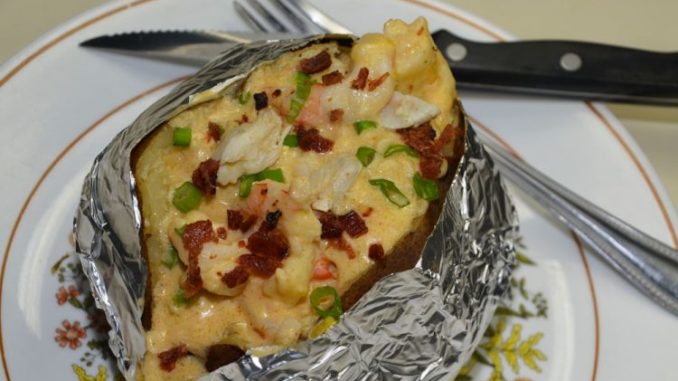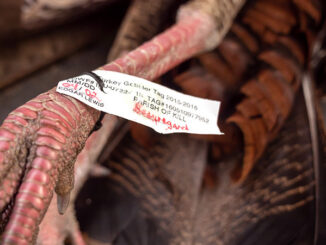
Toups stays busy in houseboat kitchen
“Tonight we do Cajun,” proclaimed the rugged man’s man with a flourish. “I’m a Coonass — but I’m really half-Italian and half-Cajun. My Momma was a Baldissaro.”
Trent Toups was holding court on his 65-foot houseboat in the Red River South Marina, south of Shreveport.
“This houseboat is my fishing base and it’s a place for my kids to come swim and water tube,” he said. “Not many people in Bossier-Caddo have houseboats. It must be a relic of my heritage. My great grandmother Champagne and her daughter, my grandmother Baldissaro, lived on houseboats.”
The 39-year-old owner of AirCare Heating and Cooling Services was born in Marrero, but has lived in Shreveport since he was about 10. He credits his family for his cooking skills.
“I watched my mother cook. Mom was a very good cook — one of the best cooks I know. One of things I like is she cooks oyster dressing two different ways: one rice and the other bread. I like the bread one 10 percent more than the other,” he said, rolling his eyes and licking his lips.
“She taught me how to use seasonings — how to pair them with dishes. And she taught me not to overcook seafood. A lot of people do that.
“Her momma, Dot Baldassaro, cooked Italian because her husband was Italian. She stuffed melatons (mirlatons) with shrimp. I remember stuffed bread crumbs. I like that with a spaghetti sauce on the outside and baked a little.
“My Toups grandma is from Lafitte. They lived on the bayou. In the summer, me and my brothers would work on the family shrimp boat. Five uncles had shrimp boats. We would take a can of ravioli and set the closed can on the engine block. That was our stove.
“Grandpa liked white beans; that was his favorite. Legend has it that my grandma would soak the beans and then peel every one of them.”
Trent readily admits that he cooks a lot, in fact, he’s the cook of the house. “I fish and I hunt; that’s what I do, but cooking is a passion. I would love to have a small hole-in-the-wall restaurant and cook for people.”
Trent’s Shrimp and Crabmeat Stuffed Potatoes
Trent Toups is a totally spontaneous cook. He humorously mumbled in the kitchen. “I don’t know where I got the idea for this. I think it was when I needed to make something at the deer camp. I love seafood and I wanted to give a different twist to it.”
Because he cooks off the top of his head, he constantly rummaged through the houseboat’s kitchen cabinets to see what he could try adding. Although the next time he cooks the dish, it may have different ingredients, this version is a guaranteed winner.
It is decadently creamy — and a must for baked potato lovers.
TIP: Using ripe bell peppers instead of green ones creates a sweeter, less sharp flavor. Using three colors is simply for appearance. All ripe peppers taste alike, so for taste’s sake, using one color is fine.
INGREDIENTS:
- 6 very large baking potatoes
- 1 1/4 lb. large shrimp, peeled, deveined and split lengthwise
- 3 slices thick-sliced brown sugar cured bacon
- 1/3 cup cooking oil
- 1/3 cup flour
- 1/2 cup chopped red bell pepper
- 1/2 cup chopped yellow bell pepper
- 1/2 cup chopped orange bell pepper
- 1 head of garlic, minced
- 1/4 large onion, chopped
- 1 qt. half & half
- 1 stick butter
- 1 jar cap of liquid crab boil to taste
- 1 tsp. powdered crab boil
- 1/2 lb. Velveeta
- 1/2 lb. lump crabmeat
- Cayenne pepper to taste
- Creole seasoning to taste
- 3/4 cup chopped green onion tops
PREPARATION: Serves 6.
Wash the potatoes, wrap them individually in aluminum foil and place them in a 400º oven. Allow enough time for the potatoes to cook 1 1/2 hours and be ready for the stuffing. Wash the shrimp and set them aside. Fry the bacon until it is done, crumble it and set it aside. Add oil and flour to a heavy pot. Cook over medium heat, stirring constantly to prevent burning until roux is blond in color. Reduce heat to medium-low and stir in bell peppers, garlic and onion. Cook, stirring often, until the seasonings are soft. Add the half & half and butter. Add liquid and powdered crab boil and Velveeta. Heat over low heat until the Velveeta melts and the sauce thickens slightly, about 15 minutes. Stir often. Add the shrimp and cook a few minutes until the water released by the shrimp cooks out. Stir in the crabmeat. When the sauce is thick, stir in cayenne pepper and Creole seasoning to taste. Split each potato and generously ladle the sauce on top. Sprinkle with bacon crumbles and green onions.
White Perch —with the bark on
This recipe perfectly illustrates Trent Toups’ willingness to boldly try new ingredients. Trent picked up a jar of Milani dill sauce out of curiosity at a local Shreveport seafood market. Dill is commonly used in Scandinavian seafood, but is probably the last herb one would expect to be used in Louisiana. If this sauce isn’t available where you shop, try mixing some dried dill weed into the butter sauce instead.
Trent grills catfish more often than crappie, but is quick to admit that the mild white flesh of crappie is perfect on the grill, as long as it isn’t over-seasoned. The flesh is eaten right off the crisped skin with a fork.
INGREDIENTS:
- 16 medium to large crappie fillets with skin and scales left on
- 2 sticks butter
- 2 tbsp. Milani dill sauce
- 2 tbsp. chopped parsley
- 3 tbsp. lemon juice
- 1 tsp. onion powder
- 1 tbsp. Worcestershire sauce
- Creole seasoning to taste
PREPARATION: Serves 4.
Heat a barbecue pit to medium-low temperature. While pit is heating, wash the crappie fillets to remove any stray scales, lightly dry them and set them aside. Over low heat, melt the butter in a small sauce pan. Add the dill sauce, parsley, lemon juice, onion powder and Worcestershire sauce and stir to blend. Add Creole seasoning to taste. Spread the fillets, skin side down, on a platter and dust them with more Creole seasoning to taste. Spread the fillets, skin side down on the grill’s grates and baste them with the butter mixture. Repeat the basting 3 or 4 minutes later. Cook until the flesh flakes with a fork, between 5 and 10 minutes total.


